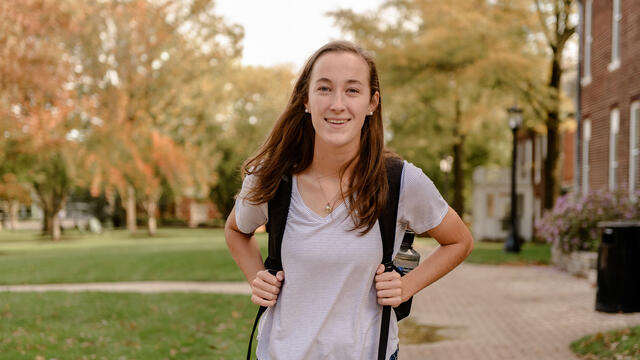Scholarship winner takes time out for cancer research before medical school
Kristen Upton ’18 is taking a gap year before using her most recent honor, the Maryland Association of College Directors of Athletics (MACDA) scholarship, towards medical school — if, that is, doing cancer research at the Children’s Hospital of Philadelphia (CHOP) can be considered a gap year.

Kristen Upton took a gap year before medical school to do research at Children's Hospital of Philadelphia.
Kristen Upton ’18 is taking a gap year before using her most recent honor, the Maryland Association of College Directors of Athletics (MACDA) scholarship, towards medical school — if, that is, doing cancer research at the Children’s Hospital of Philadelphia (CHOP) can be considered a gap year.
The Biochemistry and Chemistry-Kinesiology major from Chalfont, Pa., works full time at the Maris Lab at CHOP researching neuroblastoma and will begin applying to medical school next spring.
“I am really excited for this opportunity,” Upton said of her work in research. “Not only do I get to continue conducting cancer research, but I am working at the place that helped me as I was growing up.”
The Green Terror soccer star was diagnosed with reflex neurovascular dystrophy (RND) when she was 11. The condition causes nerves to short-circuit and send pain signals when nothing is wrong as well as to amplify normal signals.
“A poke to anyone else would feel like a punch to me,” Upton said, remembering the 10 weeks over four years she spent as both an inpatient and outpatient at CHOP. “The treatment consisted of intense physical and occupational therapy, eight hours a day, five days a week.
“It was a journey, but compared to some of the other patients I met during my time there I was very fortunate.”
Her experience at CHOP forged her resolve while sparking her interest in becoming a doctor. She never let her condition stand in the way of her success in school and on the soccer field.
“Being at CHOP as a patient taught me a lot about hard work, perseverance and staying positive,” she says. “All of which are skills that I have taken and applied throughout my life.”
Upton adds the MACDA postgraduate award to a long list of accolades earned both on the soccer field and in the classroom. Selected in 2016 and 2017 a Scholar All-American and Centennial Conference (CC) Scholar-Athlete of the Year, she was named to the CC Academic Honor Roll as both a sophomore, junior and senior. On Dean's List in each of her eight semesters and the McDaniel Green and Gold Honor Roll each of the last three years, she was also a CoSIDA Academic All-District II first-team selection in the fall of 2017.
In May, she graduated summa cum laude, a College Scholar with Honors in Chemistry-Kinesiology. She received the Mary Ward Lewis Prize as the most outstanding female graduating senior and The Dr. H. Samuel Case ’63 Senior Scholar Athlete Award.
She co-founded and served as president of the pre-health club on campus, vice president of the Kinesiology club, and was a member of the Honors program and Heroes Helping Hopkins. She was involved in honor societies, including as president of Gamma Sigma Epsilon (Chemistry), secretary of Beta Beta Beta (Biology) and was inducted into Phi Beta Kappa, Alpha Lambda Delta (First Year) and Omicron Delta Kappa (Leadership). In addition, she has worked as an admissions ambassador and as a peer tutor for McDaniel’s Student Academic Support Services Office.
Her work at CHOP in cancer research isn’t her first venture into the field. She worked with Chemistry professor Dana Ferraris researching PARPs, a family of proteins that are overexpressed in certain cancers, and presented at American Chemical Society conferences. Upton explains that in traditional cancer treatments, therapies such as radiation or chemotherapy try to damage cancer cells and their DNA, but some members of the PARP family are able to help repair the damaged DNA. This allows the cancer cells to live on. Inhibiting these proteins, may make cancer treatments more efficient by stopping the DNA repair.
“Our research focused on one specific PARP protein, PARP14. This enzyme is actively upregulated in multiple myeloma and human hepatocellular carcinoma showing that it could have an important role, but its exact function and the mechanism of how it works still needs to be determined,” she says. “We worked to design and synthesize a small chemical probe for PARP14, so that we could selectively inhibit this protein and be able to determine its function in the cancer cells.”
Balancing research, coursework and soccer practice with community service, Upton was a four-year starter in all 82 games as a defender for the women's soccer team. During Upton’s soccer career, she posted three all-conference selections that include a first-team selection each of the last two seasons. She led the Green Terror to four straight postseason appearances, including earning three straight NCAA at-large tournament bids.
Still, she logged many an hour as a volunteer at the University of Maryland Shock Trauma Center in Baltimore and spent time observing the cardiology department at the Children’s Hospital of Philadelphia (CHOP) and the cardiothoracic department at the University of Kentucky and Lexington Veteran’s Affairs Medical Center.
McDaniel students have won the MACDA scholarship in five of the past nine years, including Nicole Hill (women's soccer) in 2017, Brad Brooks (men's swimming) in 2016, Paige Messersmith (women's lacrosse) in 2013 and Emma Ardolino (field hockey) in 2010.